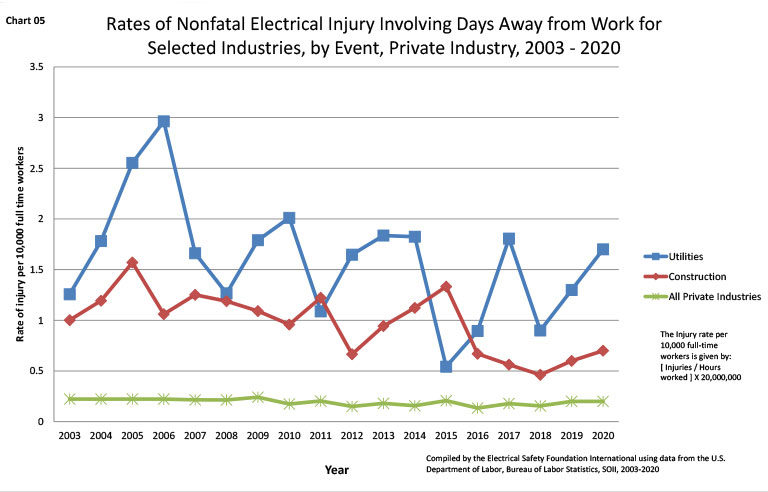On-the-job electrical fatalities fall, but injuries up, analysis finds

Arlington, VA — In 2020, 126 U.S. workers suffered fatal electrical injuries, a 24% decrease from the previous year, but nonfatal electrical injuries involving days away from work increased 17% over that same span, according to a recent data analysis by the Electrical Safety Foundation International.
Examining data from the Census of Fatal Occupational Injuries, ESFI found that 44% of the electrical fatalities involved workers in construction and extraction, while 20% involved those in installation, maintenance and repair. Among the 2,220 nonfatal electrical injuries involving DAFW – reported amid a 10% decrease in hours worked in 2020 – the most impacted occupations were installation, maintenance and repair (31%); service (25%); and construction and extraction (21%).
Other findings:
- The number of electrical fatalities in the workplace marked the fewest since the data was first compiled in 2003.
- 40% of the deaths and 13% of the injuries involved Hispanic or Latino workers.
- 63% of the injuries occurred among workers employed by their organization for at least one year.
- The rate of work-related electrical fatalities was highest for the mining (0.8 per 100,000 full-time equivalent workers) and construction industries (0.6 per 100,000 FTEs). For all industries, that rate was 0.09 per 100,000 FTEs.
- Overall, 5.3% of all electrical incidents reported were fatal.
- Contact with or exposure to an electric current accounted for 2.6% of the fatalities.
| Sign up for Safety+Health's free monthly email newsletters and get the news that's important to you. |
“By studying how and why workers are getting hurt, ESFI can create new materials to help educate all workers, whether they work regularly with electricity or not, to stay safe on the worksite to prevent these avoidable incidents,” the nonprofit organization says in a press release.
In 2019, ESFI released a series of resources with recommendations intended to help workers in nonelectrical jobs stay safe around electrical hazards.
Post a comment to this article
Safety+Health welcomes comments that promote respectful dialogue. Please stay on topic. Comments that contain personal attacks, profanity or abusive language – or those aggressively promoting products or services – will be removed. We reserve the right to determine which comments violate our comment policy. (Anonymous comments are welcome; merely skip the “name” field in the comment box. An email address is required but will not be included with your comment.)

